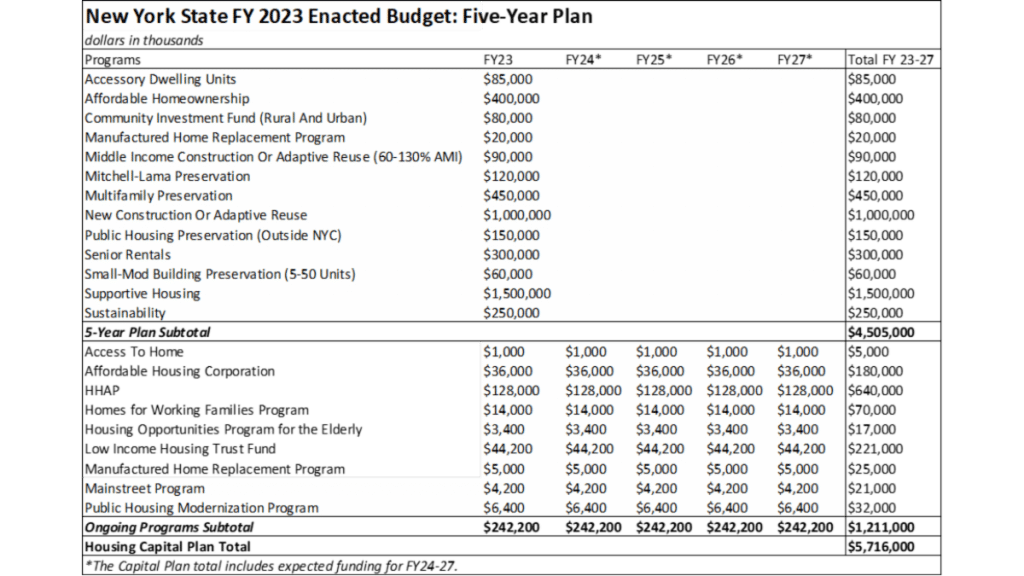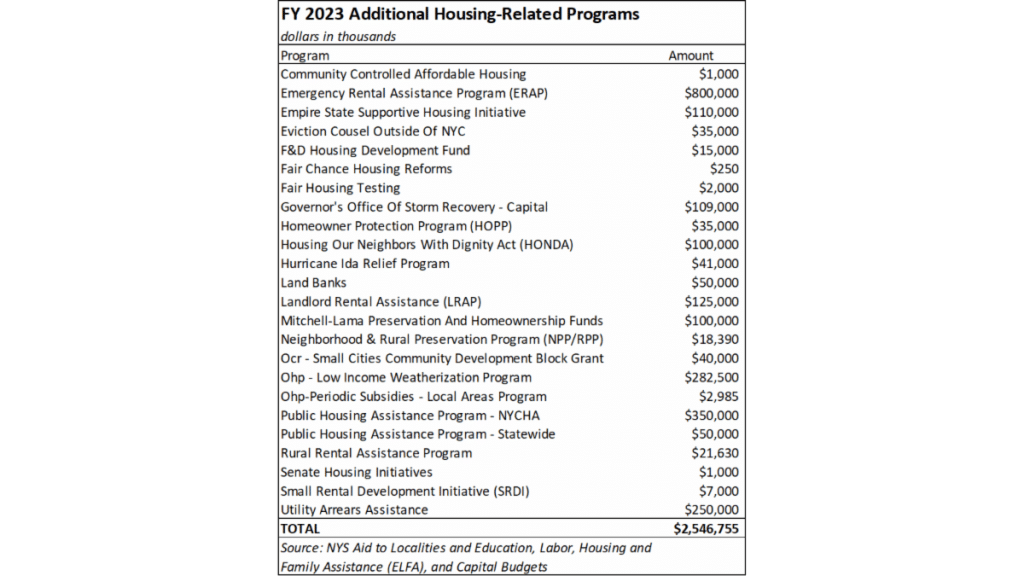Governor Hochul and the Legislature reached an agreement last week on the FY2023 Budget, representing $220B in spending. We are pleased that the budget includes a new $25B, 5-year statewide affordable housing plan, some funding for NYCHA, and much-needed aid to renters still facing the financial instability brought by the Covid-19 pandemic. The state’s new affordable housing plan aligns with many of our recommendations issued in a December report but falls short of recommended funding levels such as NYCHA. Find HCR’s press release here.
NYHC commends Governor Hochul and the Legislature for adopting a new 5-year housing plan ensuring continued investment in affordable and supportive housing across New York State. Investment in housing is a down payment on a better future for New York. More than 1 million NY households struggle to afford rent each month and 90,000 individuals experience homelessness on any given night. NY’s new housing plan will help combat our affordability and homelessness crisis.
Here is an overview of housing-related programs in the enacted budget.
- 5-Year Housing Plan: The adopted budget includes a new $5.7B five-year housing capital plan ($4.5B to be spent over 5 years plus 1.2 billion in ongoing programs ($242M must be appropriated annually in FY24 – FY27 for ongoing programs)). The plan includes $1.5B for supportive housing, $1B for new construction or adaptive reuse of rental housing, $450M for multifamily preservation and $400M for affordable homeownership. According to Governor Hochul’s release, the plan also includes $8.8B in State and Federal tax credits and other federal allocations, and $11B to support the operation of shelters and supportive housing units and to provide rental subsidies. It also provides for the electrification of an additional 50,000 homes as part of the state’s plan to electrify one million homes and makes another one million electrification-ready. Overall, this represents a significant increase in state capital investment compared to the last plan.
The enacted budget also includes funding for a number of crucial housing programs outside of the 5-year housing plan:
- Public Housing: The enacted budget funds a Public Housing Assistance Program with $350M for NYCHA and $50M for public housing statewide outside of New York City. While this funding is helpful, NYCHA requires a multi-year appropriation and a long-term joint City-State strategy.
- Expanding Affordable Homeownership: Outside of the major $400M investment in capital resources for the creation of homeownership opportunities in the new housing plan, the budget also funds a number of programs for the provision of affordable homeownership throughout the state. These include:
- A $50M land banks initiative
- An allocation of $36M for the Affordable Housing Corporation (AHC), which provides grants to nonprofits to subsidize the cost of newly constructed houses and the renovation of existing housing.
- A $100M Mitchell-Lama Preservation and Homeownership Program to preserve Mitchell-Lama units and to create more permanent homeownership opportunities. Some of this program’s funding may be used for an affordable homeownership proposal like that seen in the Assembly one-house budget—known as the Foundations for Futures (Limited-Equity Co-ops Program). However, the details for this program will be dictated by HCR and are TBD.
- Hotel Conversions: The adopted budget provides $100M for the distressed hotel and commercial conversion program known as HONDA. This program was initially funded a year ago and no projects have yet been financed. Unfortunately, without legislative changes to the Multiple Dwelling Law to facilitate conversions to residential use, the program may continue to face difficulties in carrying out these conversions.
- Rental Arrears Aid: While state legislators and the Governor continued the call for the federal government to provide adequate levels of emergency rental assistance funding, they have agreed to provide a total of $925M to expand the existing state programs. The adopted budget includes $800M for the Emergency Rental Assistance Program (ERAP) and $125M for the Landlord Rental Assistance Program (LRAP), using a portion of the Coronavirus Pandemic Relief Fund. The budget also includes $250M to help New Yorkers make up utility arrears lost due to the pandemic. This is great news for thousands of households with arrears who applied for funds but would not be assisted due to the gap between funding and need.
Priorities Not Included
- The Housing Access Voucher Program (HAVP): Despite both houses including versions of this bill sponsored by Housing Chairs Senator Kavanagh and Assemblymember Cymbrowitz (S2804B/A3701B), it was not included in the adopted budget. The bill would create a statewide rental assistance program for individuals and families who are experiencing homelessness or housing instability. This program is urgently needed to prevent homelessness and promote housing stability.
- Fair Housing: The budget provides $35M in funds for Eviction Counseling outside of NYC, a welcome expansion in the spirit of NYC’s right-to-council initiative, $250K for improving access to housing for people with prior arrests or conviction records, and $2M in Fair Housing Testing funds. However, the “fair housing” proposals seen in the executive budget, which prohibited the outright denial of a tenant application based on criminal record and credit history or score were not included in the adopted budget.
- Land-Use and Zoning Policies: While the budget includes $85M for accessory dwelling units (ADU), regrettably, a powerful set of housing production-related policies were dropped out of the enacted budget. These include a lifting of the current residential floor area ratio (FAR) limit, regulatory relief for hotel and commercial conversions, and ADU legalization and subsequent basement and cellar conversion language (included in the Governor’s 30-day amendment of the Executive Budget). These policies have the potential to create thousands of housing opportunities for New Yorkers, we are disappointed to see them not make it into the adopted budget.
- 421-a Replacement: In addition to the other housing-production-related proposals put forth by the Governor, the Legislature and Governor were not able to agree on a replacement for the 421-a program. The Executive Budget included a new iteration of the tax credit set to expire in June known as the 485-w the Affordable Neighborhoods for New Yorkers Tax Incentive Program. Read the Furman Center’s blog post comparing the Governor’s proposal to 421-a to learn more.
The Legislature will have the opportunity to continue to work to agreement on the remaining housing policy issues until the sessions in June. For a program-by-program breakdown of the FY22-23 adopted budget, see the NYHC Enacted Budget Tables below or download a pdf version here.

